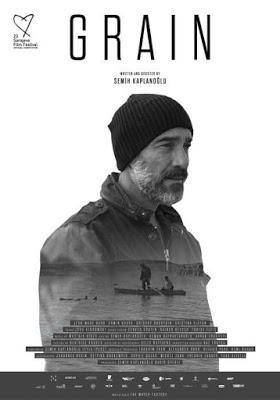 Grain is a very important film of 2017.
Grain is a very important film of 2017.
It is an important for several reasons. Globally, very few feature films have dealt with agriculture as the focal point. In India, several important films were made on social themes related to agriculture—Mother India (1957), Do Bigha Zameen (Two acres of land) (1953) and Upkar (Good Deed) (1967) are examples. China’s Red Sorghum similarly dealt with society more rather than agriculture. Even the celebrated Russian film, Dovzhenko’s Earth (1930) dealt with social issues of collective farming rather than agriculture per se. Semih Kapalonglu’s Grain is a rare feature film where the focus is more on agriculture and science, and less on the social fallouts. A rare film that could be compared to Grain in content is Richard Fleischer’s Soylent Green (1973)—a Hollywood film on a bizarre industrial response to alarming global food shortages.
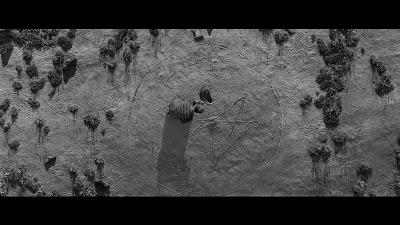
Prof Erin (Barr) finally stumbles on an underground store of true, uncontaminated
wheat seeds, collected by ants that could revive natural agriculture
in uncontaminated soil.
(The rough diagram indicate the typical ant-storage architecture, according to Kaplanoglu,
which unfortunately is not explained to the viewer in the film)
Grain is notable because the film highlights the viewpoint of those who oppose the cultivation of genetically modified agricultural crops known as GMOs. GMO crops are those crops that have their DNA artificially altered by a process that does not happen naturally. The artificial process introduces genes from a different species or organism into the natural crop, boosting the ability of the altered crop/organism to survive diseases, herbicides, fungicides and even extreme climates. More than half of the countries within the European Union have banned GMOs until long-term studies conclusively prove these to be safe for long-term human and animal consumption. The pro-GMO lobby asserts the modified crops are safe and necessary to feed the increasing populations. The controversy has led to many products sold in the market to be clearly marked as either “Organic” or “non-GMO” for the consumer who cares to consume safe farm produce. Most GMO crops are grown on soils treated by chemicals necessary for such GMO cultivation. Chemical contamination of soils where GMO crops have been cultivated is another growing source of concern highlighted in the film Grain.
Like the 2022 setting of the 1973 film Soylent Green, Kaplanoglu’s English film is a sci-fi film that is set in the near future. In the film Grain, GMO crop cultivation is the accepted norm for the majority of the population presented on screen and the private sector that develops and promotes GMO crop cultivation is a formidable and unrelenting force if one cares to challenge it. Soils have been contaminated by the associated chemicals required to grow GMO crops. Immigrants from less-endowed nations crowd “processing” centres hoping to be accepted by the richer countries even if they have to deal with its strict policing. People die of strange epidemics and when they die their bodies don’t rot or create a stench. This indeed is a dark subject fit to be made in black and white rather than in color.
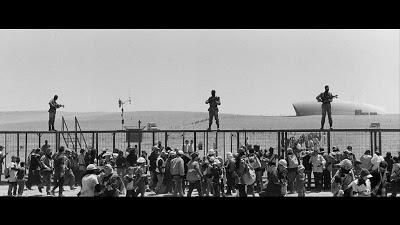
Opening sequences of multi-ethnic immigrants seeking better food and life
in countries with strict policing and controls
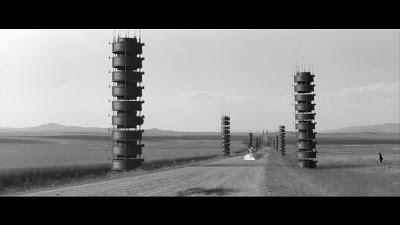
Electro-magnetic "walls" keep undesirable immigrants away from the land of plenty
Kaplanoglu is a known admirer of the films of the acclaimed Soviet filmmaker Andrei Tarkovsky. Kaplanoglu’s earlier film Milk , a constituent of his semi-autobiographical Yusuf trilogy, had a sequence where the protagonist’s mother is sitting on a fence just as Tarkovsky’s mother did in Tarkovsky’s famous autobiographical film Mirror (You could refer to the review of Milk on this blog showing that scene). There are several sequences in Grain that will remind a cineaste of Tarkovsky’s reflective sci-fi films Stalker and Solaris and even the theologically imbued final work Sacrifice, with a lone tree in a barren landscape.
Grain’s original script, written by Kaplanoglu and his wife Leyla Ipecki, is not a typical sci-fi film. Beyond the sci-fi text is an overt layer of theology that is remarkably close to the films of Tarkovsky and perhaps even Kubrick’s 2001-A Space Odyssey. In an interview with this author, Kaplanoglu revealed that the inspiration for making this film came from a chapter/portion of the Holy Quran called Khef or the Kahf (cave) Sura . The entire film Grain questions the wisdom of human beings tinkering with nature, what the Creator of earth provided and the fallouts of such scientific meddling.
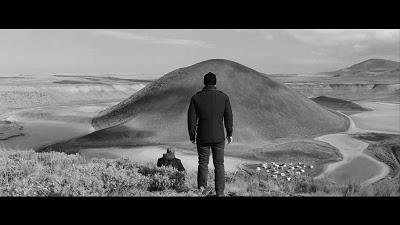
Stark beauty of Anatolia (Turkey) provide the location for the filmmakers
where people in the film die suddenly from unknown epidemics
The film is not about disparaging conventional agricultural research involving hybrids and products of varietal cross breeding but those specifically about tinkering with natural species to create man-made species, and mindless destruction of natural resources in its wake for the sake of profit. The film Grain attempts to interconnect the life in a grain of wheat with life in humans, and how even lowly ants instinctively try to collect and preserve naturally occurring non-modified organic wheat grain for their own species’ survival. The argument the film present is notable absence of the fictional “n” particle missing in GMO crops but present in naturally bred crops.
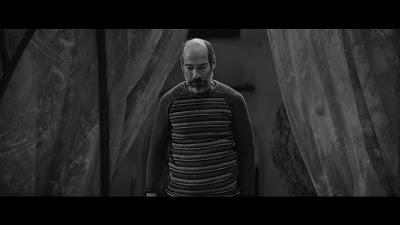
The Prof (Barr) comprehends the importance of non-contaminated soil
and natural organic farming devoid of chemicals
Grain is also important as the director Kaplanoglu and co-scriptwriter Ipecki try to contrast science with spirituality and theology. The end product can befuddle many and yet offer food for thought to those viewers who can pick up the details of spiritual metaphors, visual and verbal, that pour in cascades.
The story of Grain revolves around a seed geneticist Prof Erol Erin (Jean-Marc Barr, a French/American actor) who lives in a fictional city in the near future, the inhabitants of which are protected from multi-ethnic emigrants with electro-magnetic walls. “Erol” in Turkish means “brave.” For reasons unknown, the city’s nearby agricultural resources have been hit by a genetic crisis. In an internal meeting at the headquarters of the corporation that employs the geneticist, he learns of a fellow scientist who wrote a thesis on “Genetic chaos and the N particle” about the recurrent crises affecting genetically modified seeds is no longer employed by the corporation. In pursuit of this elusive scientist named Cemil Akmann (Ermin Bravo, a Bosnian actor), Prof Erin meets up with his daughter, who is silently communicating on the computer in a language unknown to the professor, living alone in a huge house in disrepair and apparent neglect. A word that appears on her computer screen is ELOHA (the Hebrew name for God). Prof Erin sets out to meet the fellow scientist in a perilous journey and does find him. The journey, though totally different from Tarkovsky’s Stalker, has several visual references to the Russian film masterpiece. There are exquisite shits of the Anatolian landscape in Turkey captured by cinematographer Giles Nuttgens adding hues of mystery and awe in equal measure, somewhat like the desolate word of the Dead Zone in Stalker. In Stalker, there is a stray dog that inspects the sleeping travellers; in Grain, a wolf inspects the tent of the sleeping Prof Erin. In both films, there is only a thin line that divides dreams and reality. In Grain, a child converses to the professor in the night in a dream sequence and then disappears under equally strange circumstances into the darkness. (Dreams play significant roles in two very important films of 2017: Grain and the Hungarian film On Body and Soul.) After meeting Akmann, Prof Erin prefers the life style of Akmann and chooses not to return to the city.
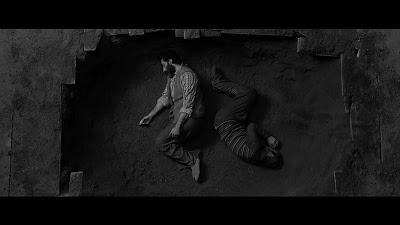
Two scientists, Cemil Akmann (Bravo) and Prof Erol Erin access
the non-contaminated soil that can grow true organic crops and fall asleep
after transporting it to useful locations for safe use
The film even includes a visual of burning bush that will strike a chord with viewers familiar with texts of the three Abrahamic religions. The Burning Bush on Mount Horeb (mentioned in the Book of Exodus in The Bible) is a bush that is never consumed by the fire and Moses is directed by God to remove his footwear as per the ancient religious texts, as he approaches the bush, while tending Jethro’s flocks. But is the Professor actually encountering the burning bush/tree or is it a dream? Those who have read the religious texts will associate the Burning Bush as a holy ground from where God speaks to Moses.
The film Grain begins with ultra modern electro-magnetic walls to keep out undesirable human beings and ends with a sequence where Akmann and Prof Erin spend time inspecting a stonewall, removing a stone here and there to peer through the gaps in the wall to glimpse Paradise. As in the end of 2001--A Space Odyssey, the final silent spectacle speaks for itself. Kubrick was an atheist; Kaplanoglu is not.
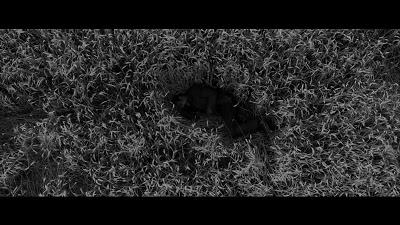
Sleeping among growing crops, like a child in a mother's womb--touches of Tarkovsky
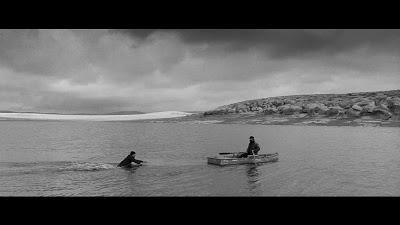
The two scientists team up
This is a film that is important for viewers familiar with the GMO debate. The pro-GMO enthusiasts will debunk the science in this English film, which is a Turkish-German-Swedish-French-Qatari co-production. According to the director, the film has been wilfully kept out of certain important film festivals that wanted to initially screen the film by the influential pro-GMO lobby. In spite of this, the film won the top award at the Tokyo film festival. The film was shot in Michigan (USA), in Germany and in Turkey. Visually the film is stunning in its stark beauty—an antidote to colour and natural flora that one encounters in commercial cinema. The subject itself is an antidote to the prescription of better world as seen by the private sector corporation for us.
Whether one agrees with the basic scientific premise of the film or not, Grain is definitely one of the most important films of 2017, arguably the most ambitious work of Kaplanoglu, especially for any reflective viewer with either an interest in science or in theology/spirituality.
P.S. The film Grain won the Best Film award at the recent Tokyo Film Festival and is included among the author's top 10 films of 2017. The Kaplanoglu films Honey and Milk have been reviewed earlier on this blog. The Tarkovsky films Solaris and Mirror, mentioned above, have also been reviewed earlier on this blog. The Hungarian film On Body and Soul has also been reviewed on this blog. Turkey did not submit the film to compete for the Best Foreign Language film Oscar as the film was primarily in English. (Click on the coloured name of the film in this post-script to access that review)

